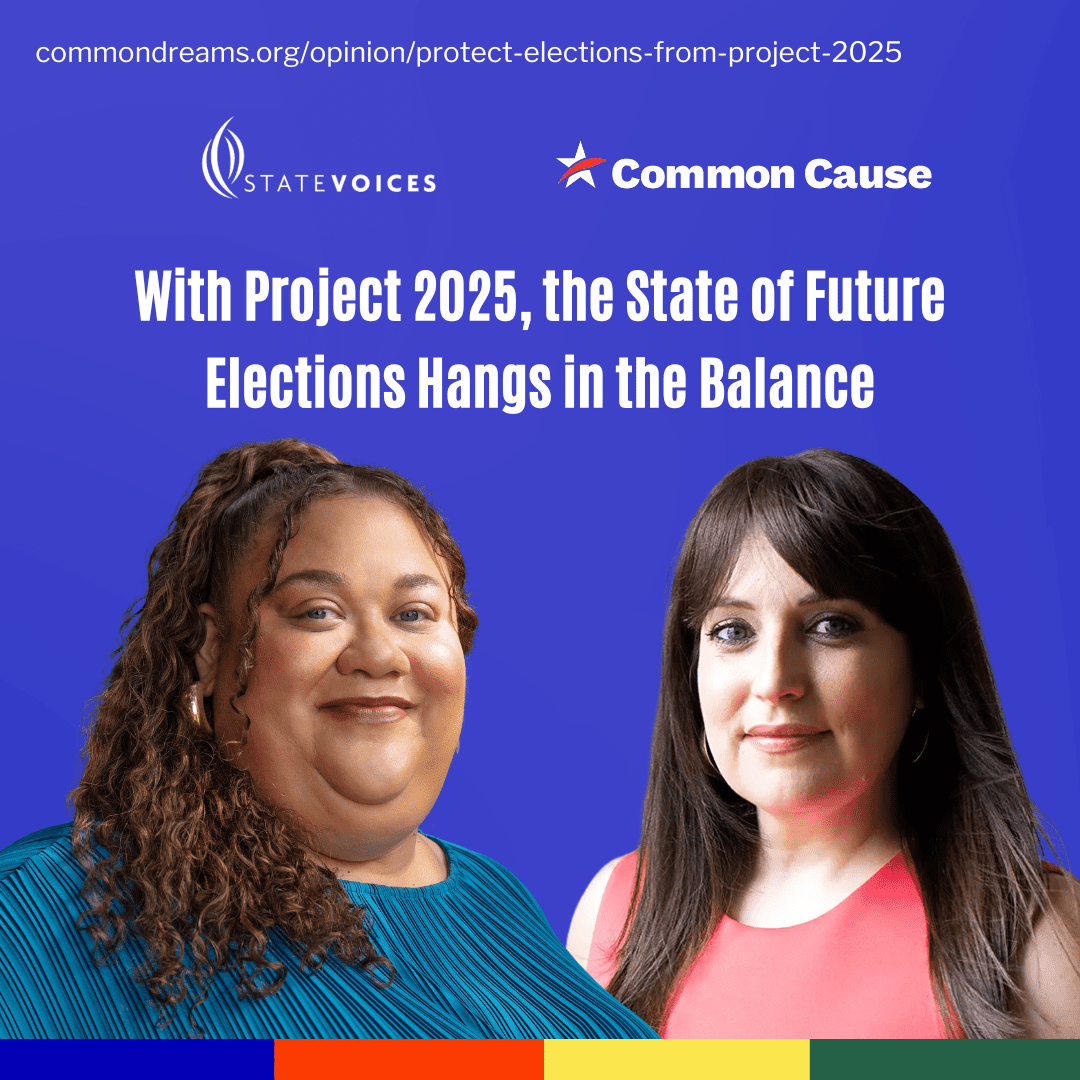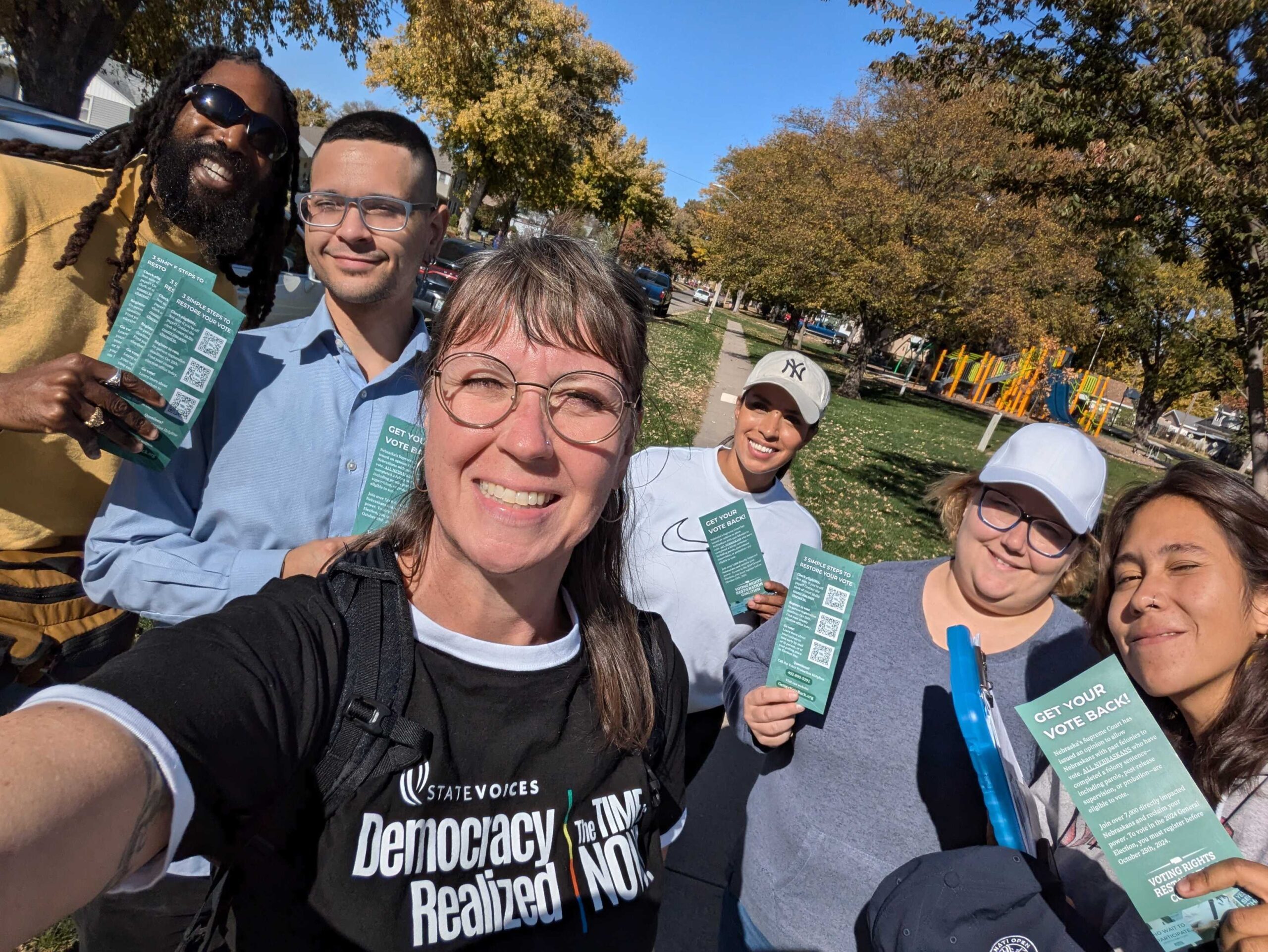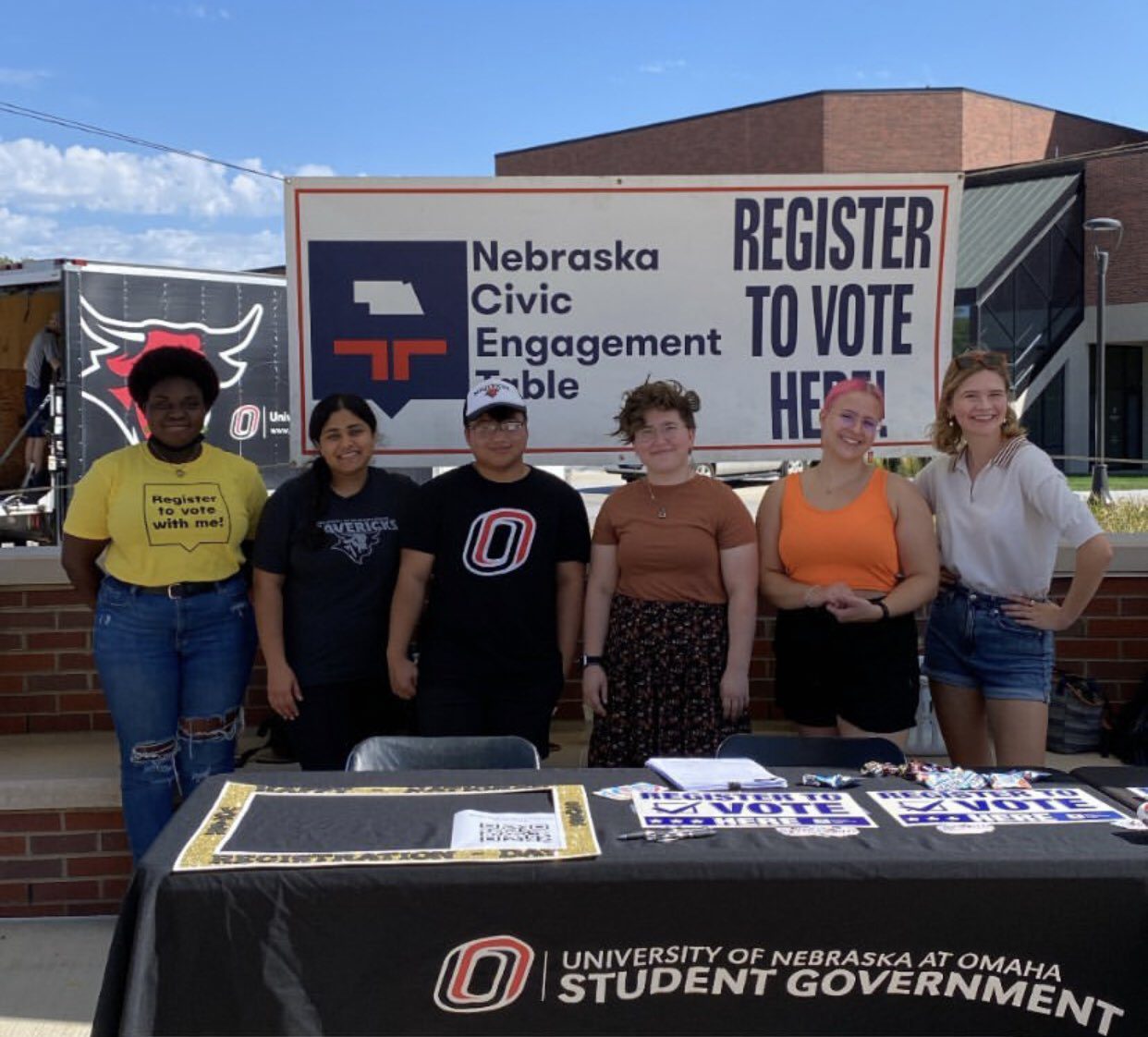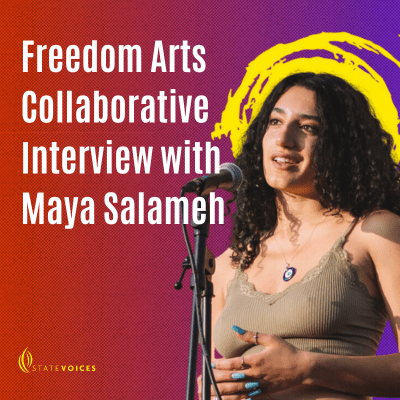State Voices’ Freedom Arts Collaborative is proud to present the Artist Interview Series. In this series, BIPOC artists provide personal perspectives and reflections on making their art and civic engagement an everyday practice. State Voices’ Freedom Arts Collaborative began in 2021, featuring a cohort of BIPOC artists’ work that envisions a BIPOC political power through their chosen medium.
In the second installment of the Freedom Arts Collaborative: Artist Interview Series, our host and State Voices Digital Storytelling Fellow, Linda Denson, speaks with Maya Salameh. Maya is a Syrian-American poet, performer, and teaching artist from San Diego, California. She is the author of How to Make an Algorithm in a Microwave and the 2022 winner of the Etel Adnan Poetry Prize. Together Maya and Linda explore the intricacies of navigating personhood when holding marginalized identities in an increasingly digitally surveilled world, why everyone should and can be a poet, and how freeing ourselves from shame can help lead to a more liberated world.
Content warning: Discussions of state violence.
Transcript:
LINDA DENSON: Welcome to the 2023 Freedom Arts Collaborative Podcast. Art allows us to explore our imaginations as we envision a liberated world that has not yet existed. It is important to lift up artists using their voices for power. That’s why we started the Freedom Arts Collaborative in 2022, a cohort of several BIPOC artists using various mediums to fight for our liberated future. This year we’ve selected various artists from across the country to interview about art as embodied civc engagement. This episode has a content warning for discussions of state violence.
MUSIC
DENSON: I’m Linda Denson. The 2023 Digital Storytelling Fellow at State Voices. And I am here with Maya Salameh. Maya is a Syrian-American poet, performer, and teaching artist from San Diego, California. She is the author of How to Make an Algorithm in a Microwave and the youngest-ever winner of the Etel Adnan Poetry Prize.
DENSON: Yeah, this is the first question. In this cohort of the Freedom Arts Collaborative at State Voices, we’re exploring art as a form of embodied civic engagement. And so I’m wondering what those words like civic engagement means to you. Like, what do you think of when you hear that?
SALAMEH: Yeah, I think growing up in San Diego, I grew up around a lot of, like, border town political programming. And there’s a lot of movement around, like immigration, border patrol, and migrant rights. And so growing up, I think civic engagement, especially for me, especially growing up in a first-generation Syrian family, meant mostly organization around immigration rights. For me, I think my engagement was mostly around voting when I could and also mutual aid. I think as I learn more, civic engagement increasingly means mutual aid.
DENSON: Mmhmm.
SALAMEH: I’ve been really inspired in this thinking by my friend, Kayla Williams, who has started like their own mutual aid organization and by other friends who have just demonstrated to me the principles of mutual aid. Whether, you know, that means starting your own org or simply helping the people around you (laughs) who form the community around you. So I think civic engagement for me has probably changed from being civic engagement, capital C-E, the way I thought about it in high school, to more interpersonal action and collaboration.
DENSON: Mm. No, yeah, that’s lovely. I feel the same way definitely around mutual aid. Yeah, I guess to get into sort of your artistry and your writing process, where do your creative ideas originate? I love asking different types of artists this based on the medium. Some people, like, are very auditory, and they hear things and they, convert them into their medium where they see things. I was just wondering like — walk me through how a poem starts for you.
SALAMEH: Yeah, I’ve never been, uh, like sit down and write an entire poem person. I always wish I was one of those girls, but I think I’ve always been like a Franken kind of creator. I have a very long-running Google Doc where I… I’m a very forgetful ass person, so I have to text myself things or they’ll get lost. So every so often I text myself like lines or like titles or quotes I hear on Scandal that feel weirdly poignant (laughs) and put it into this like monster 40 page Google Doc of like bits and pieces of things.
And then every so often, almost every day, actually, it’s… this is like my favorite thing to do, (laughs) I will sit down and go to this Google Doc or sit with myself and think, “Okay, like, where was I going with this or this string connects to, like, this string from two months ago, and, oh, like, this thought has been percolating for a minute.” I think usually a poem it begins as like a little flint or like a little spark and I’m like, “Hmm, there’s a poem in there somewhere.” I’m a magpie like that. And then they develop slowly, I think. But I’ve always… I think lately I’m also trying to be more intentional about valuing the slowness of process over production.
DENSON: For sure, I definitely agree with that. We also probably share a lot of qualities as Virgos, period.
SALAMEH: Mm-hmm. Mm-hmm.
DENSON: But (laughs), no, I know as a screenwriter things definitely I have a similar document just like, “Hmm, that would be funnier, like that would be cute too.”
SALAMEH: Yeah, I think that’s really dope.
DENSON: Yeah, I actually tweeted just the other day that, like all my scripts start out as poems.
SALAMEH: Really?
DENSON: So I never… I’m not… I don’t call myself a poet. I don’t see myself like as that being one of my mediums. I never share poetry. But like I find that like most of my creative ideas like start in like auditorially and then my … the easiest way for me to like condense… I was talking to Ijeoma about this, like condense a vibe, it’s to, it’s to write a poem.
SALAMEH: I also… I love what you said, and I also feel like one thing I’m really passionate about is like people who are afraid to call themselves artists in a certain discipline. Like, I’ve danced informally in my churches like Lebanese folkloric festival for years and years, but I’m like “Oh, I’m not a dancer because I haven’t taken a class or I haven’t done this.” But, like, that’s made up.Like, you write poems so you’re a poet. It’s that easy to me. But yeah, I think it’s really cool, especially for multi-dimensional thinkers. Yeah.
DENSON: Thank you for that. The next question I have written down here, and please answer this however it resonates with you because it’s pretty vague. But who do you write for?
SALAMEH: Hmm. First and foremost, I write for Arab girls and femmes and queers. Second and foremost, I write for any first-generation American girl or girl of color who grew up trying to figure out language for herself, by herself. I grew up around a lot of silences. I think, especially growing up post 9/11, I felt like I grew up in a lot of resource gaps. Um, the census legally designates Arab Americans as white and that’s a whole… that’s an hour’s long conversation around colorism, phenotype, political organizing in Levantine communities and Gulf communities and it’s a whole thing.
DENSON: Mm-hmm.
SALAMEH: But I grew up, um, observing my people being killed en masse, but not having any institutional language for it and that’s where I came to poetry and came to other girls like me, even though I’m not technically a girl, but I still use the category girl as an operating category ’cause it still feels important. Um, so girls and femmes like me who, who were trying to figure out language for their body, their country, and their belonging in an America that’s constantly, constantly surveilling and gaslighting them.
DENSON: Mm-hmm. For sure. I was just thumbing through your poems, and I was able to like read the whole thing over the past couple of days. I just want to let you know that this like pulled hair permutation, this is wonderful and it’s my favorite one.
SALAMEH: Thank you.
DENSON: … and it inspired this question, about how your poems include some really, like, personal and, like, close depictions of a bunch of things like intimacy, family, relation, religion, and like interweaves those things with, political commentary about like neocolonialism, imperialism, and all of like your intersecting identities. And so I’m wondering, like, how you think, if at all, like the personal is political and like what, what we can gain from engaging politically with the personal in that way?
SALAMEH: Mm. I’m constantly awed and informed in my thinking by Audre Lorde in this kind of thing … especially I mean her essay, um, The Power of the Erotic or-
DENSON: — Uses of the Erotic.
SALAMEH: Yes, Uses of the Erotic. I read that at a formative age and like immediately felt (laughs), um, really connected to that kind of philosophy. I think being able to expand my reading lately,, and just consistently being taught and expanded in my thinking by Black women writers like bell hooks and Audre Lorde, like they have truly I think paved the way for my own envisioning of what personal means and also dismantling respectability politics in my head versus like… Hmm, I think a lot about like the very fine line between as a writer also especially interested in like digital, um, technologies and technological surveillance. The line between revolutionary sharing and self-disclosure and violations of privacy. So I think the way I see embodiment and writing about embodiment and intimacy is as a way to fight against respectability politics and shame. I grew up in a… I don’t wanna say a culture of shame because that feels essentialist. But I think a lot of Arab girls grew up around a lot of shame around their body. Um, and then a lot of queer girls grow up with (laughs) a lot of shame around their body. And then girls who don’t know what they are if not girls grow up with a lot of shame around there body.
DENSON: Mm. Mm.
SALAMEH: So disaggregating shame and pleasure and how sometimes those places can intersect. Suaad Al-Hutawi, an Egyptian writer, who I also really love, said, “Somewhere in my brain, there’s centers for pleasure and learning interconnected. And I think for me, reading and learning and continuing to read other Asian American and diasporic women writing about their bodies. And shout out to Franny Choi, who wrote an entire book about the Asian American cyborg girl body. I think it’s called, it’s called Soft Science. Highly recommend that book. But like I love women who write their bodies viscerally, gorally, and with no apology. Because the body is bloody and disgusting and vicious and dangerous and beautiful. And I think, yeah, I’ve never been a fan of clinical writing and I think that really shows in my ethos.
DENSON: Mm-hmm. I love so much of what you said, and I could add on my own things for hours and hours, but I’ll move on to the next question. What do you think it means to live poetically and like, should we all be poets?
SALAMEH: You’re asking a very biased person, I’m gonna say yes.
(Both laugh)
SALAMEH: Everyone should be poets. I also think when I think about access, like growing up with no formal artistic training or access to artistic resources and having gone to public schools all my life until I hit Stanford, poetry was just the most accessible (laughs) way for me to express myself. I couldn’t afford… My parents couldn’t drive me to theater practice. I couldn’t afford paints or acrylics. But poetry really only requires a notebook and a pen, hmm, or a phone. So it always felt like the most immediate and accessible and de- democratic way of being able to express myself. Um, when I think about what it means to live poetically, it just means living slowly and mindfully. Poetry… I think a really nice part of poetry is that I’ve been able to access it in the spaces that capitalism forgets, meaning when I was on the way to school, on the bus, or in transit, or whatever it is, like those moments of being able to read a poem on the way to class, or being able to digest something challenging, but also digestible, if that makes sense, felt really important to me in moments when I simply did not have the time, uh, to sit down with something. But on the other hand, I also think poetry challenges you to live slowly and to pay the fuck attention.
(Both Laugh)
SALAMEH: Um, to pay attention to the smell of grass or to… what it feels like to wake up on Wednesday when it’s raining. Um, yeah, so I think for me that’s what it means to live poetically.
DENSON: That’s really beautiful. And I think that point about paying attention is especially important in, like, the attention economy now with algorithms trained to farm our attention, which brings me into, uh, a whole sort of can of worms in your writing. Your whole recent book published, How to Make an Algorithm in the Microwave intersects, I think on the back it says like, the divine and the digital. Like we use these technological concepts into like a beautiful commentary on the personal, like womanhood, your air broods, neocolonialism, things like that. So like what drew you to write about technology in this way? And I’m thinking about like some of the poems which are like utilized this sort of like algorithmic structure, like functions and things like that. Like, just talk a little bit more about what drew you to that.
SALAMEH: This book was mostly written, uh, in my sophomore and junior years, um, college. I started really realizing that it was more than a long Google Doc and a book in the spring of my sophomore year when the pandemic officially started or whatever and everyone got sent back home, and I found myself on campus with lots and lots of time (laughs) myself, um, and increasingly dependent on my laptop, which I suppose I always was.
Um, but it felt really… It was intres- It was the first time in my life that my entire work day and my entire… all of my tasks and obligations were centered on this device that I was sitting in front of all day. And then I would finish class and continue, I would just… like, I would have the work screen and then the fun screen and it was just all the screen. And it, I think, made me think a lot about the develop… the relationships that we develop with devices, especially growing up, like whether by white people, non-white people, the gender police in my own Arab community, um, just consistently and constantly surveilled. And I’ve also been really lucky to have my thinking expanded on this, by… I’m afraid to say people’s names because I don’t wanna cite them incorrectly, but a Palestinian woman thinker who I believe is named Nada Ma’boul, she’s written really interesting writing about how the Arab American woman specifically is a triply surveilled body. And I think that made me think a lot about the ways that technology is used not only to farm our data like you’ve said and farm our attention and absolutely ruin my capacity to read long things.
(laughter)
SALAMEH: Also to develop increasingly intimate ways of getting it… getting us to interact with it.
And I actually recently finished a book, um, which made me really (laughs) excited to talk to you. Um, it was called Understanding E-Carceration by James Kilgore. And he wrote an entire book about how, um, carcerality has become an increasingly digital phenomenon. And he says in the book somewhere, ” Data has supplanted oil as the essential element of economic growth.” And as someone whose entire family history has been completely changed by America’s lust for oil.I am also increasingly interested and afraid of America’s lust for data and information.
So I think this book came out of all of those wonderings of my experience in a surveilled body and also my curiosity about wanting to make the algorithm or the looker be refracted and more looked at. And so in the start of the book I talked about, … I think I’m… I call an algorithm the computers of mission of blood. And basically what I’m really interested in is cutting the laptop up, opening up its guts and saying, “Okay, this isn’t an, like, an invincible apparatus.” And of course, as we know, algorithms are big, full of the biases of their (laughs) creators. They’re racist, sexist, and every other ism, whoever made them is.
So I think by defiling the clinical nature of the algorithm a little bit, by bringing it into the visceral, gory (laughs) reality of our bodies, we render it also a body that we can challenge and question. Um, yeah.
DENSON: That’s great. You’re so… I’m so in awe of you. Yeah. I think it’s been made implicit in the conversation that the both of us are abolitionists (laughs). Um, and, um, I’ve been talking a lot with a lot of people, and ma- as in many abolitionists do about how mu- so much more of the process and the project of abolition is about re-imagination than it is about deconstruction. So I’m wondering for you and, and for everyone, like, what role poetry plays in that re-imagination process?
SALAMEH: Mm. I think poetry, and again I’m biased, right? I think poetry is one of the most important languages of re-imagination, um, not just because it’s more acceptable which I think is (laughs) also a big reason. It’s easier for the layman, and for people with limited language capabilities, limited time capacities to access, digest, and engage with poetry. Um, regular people are not reading like treatises on abolition. Regular people are living in abolition every day. And maybe they don’t have the language for it, or I think a lot about the ways that language obscures violence, and I think a lot of my work is part of unobscuring that violence. I’m also informed in my thinking by Solmaz Sharif and her amazing book — which is literally an entire book dedicated to disaggregating the military dictionary of language, which, you know, like strike, a word like strike or a word like casualty those words conceal murder. Like and the euphemizing of violence to me is a very insidious process.
DENSON: Yeah
SALAMEH: And just like you said before, the euphemizing now of violence in shiny digital packages is just as insidious a process. And so when I think about abolition, I think about Franny Choi’s, um, line in her new book, I think, yes, her new book, which is, The World is Ending Every Day or something, I don’t wanna mis-cite it but it’s her latest collection of poems and she says, “Every day an extinction misfires and I put it to work.” And I think when I think about the impossibility and miraculousness of my continued survival, despite, despite, despite— that is where if I draw lifeblood from poetry, then that poetry feeds my abolitionist thinking and energy and survival. So I think poetry is essential, essential to re-imagining the structures and the language that we use to care for and about each other, if that makes sense.
DENSON: Mm-hmm. No, yes, of course. That was so lovely. Yeah, I think we’ve touched on everything. So if…if you’re comfortable, is there anything like a poem or anything that you’re willing to like read for us today?
SALAMEH: Okay, this one’s called uh, Bronchitis is a Beautiful Name for a Girl.
California is kindling again. It’s been six brush fires and I’m nobody’s daughter calculating venials on the hood of the Buick. my brother tugs his sleeves and his
lungs stream, and we scratch the secondhand Commodore’s album, and he smiled mundane and lovely like a grocery list, nail polished carabiner Advil fruit. I’m calling
because the city is filled with pollutants, because the duplex with the red roof is falling apart. I’m calling because we argue like tonsils, swollen and stubborn. we watch the In-N-Out
cashier wash his gloves off in the sink, and my shirt makes me look fertile. we laugh about used biology books, the Disney movie about the dragon boy. we make
the sky bloom. we split the scrambled runes in our stomach. I have an aching letter in my mouth the insurance won’t cover, but I’m really afflicted with
wanting, the smell of pavement after rain. I’m calling because I have no aunts in this country to call for condoms or advice but look I walk around with prose jammed
between my legs. I’ve never loved the same mistake twice. My brother dances and the song roams throats until it finds mine. In a dream, the algorithm broke the
windows of its Massachusetts. I’m a magnesium-deficient miracle who only shaves on Thursdays. He’s got new Skechers. We make calligraphy with our shoes
walking back from school. The rash of coffee shops in El Cajon, the dilapidated Vons on Medford Street. I’m calling because California is kindling again and he refuses
medicine like I used to. I’m calling because we found the generic Sudafed and it tasted green. I still bow my head in church. My survival instinct is too strong.
DENSON: So wonderful! I think there’s such a different color to like hearing spoken words and to like reading a poem. On that lovely note, um, we will see each other soon, and (laughs) the people listening in can find you… Where would, would you like them to?
SALAMEH: Yes, um, the people can find me at Maya, M-A-Y-A S-A-L-A-M-E-H on Twitter, Instagram, and Venmo., And I have a website, a cute little artist website that my amazing friend, uh, Wendy Sanchez, has been so great at designing and helping me with, and that is mayasalameh.com.
DENSON: Lovely.
MUSIC
Categories: Integrated Civic Engagement



